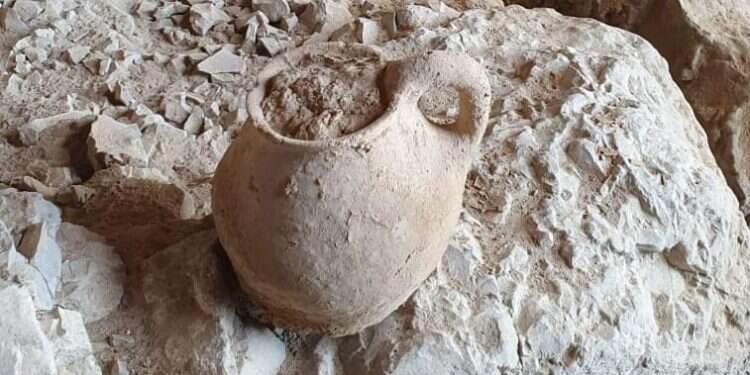The Qumran caves, where the legendary Dead Sea Scrolls were discovered, is still a treasure trove. Recently, an American tourist came across an intact pottery jug dating back to the early Bronze Age, one of only a handful ever discovered in the Judean Desert, the Israel Antiquities Authority reported this week.
Follow Israel Hayom on Facebook, Twitter, and Instagram
Five years ago, Robbie Brown participated in an archaeological dig in Cave 53, directed by Dr. Oren Gottfeld of the Hebrew University of Jerusalem and Dr. Randall Price of the University of Liberty in Virginia. Visiting Israel again, Brown wanted to show some friends the site of the dig. He took them into the cave, located 100 meters (328 feet) above the highway.
The dig in which Brown participated revealed fragments of jars and bowls that served as lids for jars, dates and olive seeds, and even a piece of a blank scroll. Archaeologists were surprised at some of these finds, because the cave had been excavated 30 years earlier by Dr. Yigal Israel and the late Dr. Rudolf Cohen, who found artifacts dating from the Neolithic to Roman periods.
The 2017 excavation was supposed to conclude official study of the cave. But last week, Brown and his friends climbed in and spotted a 5,000 year-old pottery jug. They photographed the jug – without touching it – and contacted Dr. Yuval Baruch from the IAA, who updated Amir Ganor, head of the IAA's Antiquities Robberies Prevention Unit.
Ganor rushed out to Cave 53 with cave researcher Dr. Oren Gutfeld. The two climbed up with Aviam Atar, the local district director of the Israel Nature and Parks Authority.
Ganor called the jug "amazing."
"Only about two years ago, our archaeologists surveyed the cave as part of a survey of Judean Desert caves, which has been conducted continuously for the past five years and was intended to document and locate all ancient finds in the desert caves. In a few caves, pottery shards were found, providing evidence of the Early Bronze Age. This is perhaps the first complete vessel we have found from this period in the caves in the Judean Desert.
"It's good that the person who entered the cave was Robbie, who participated in the excavation and is aware of the importance of the finds and their role in completing the archeological puzzle of the Land of Israel," says Ganor. "We call on citizens who discover artifacts to leave them in place and call us immediately so that we can maximize the archaeological information from the find."
The clay jug was removed from the cave and will be scientifically analyzed by Gottfeld, who will publish his findings.
While Brown's visit to the cave resulted in a precious discovery, the IAA warned the public that the Judea Desert cliffs are dangerous and off-limits.
i24NEWS contributed to this report.
Subscribe to Israel Hayom's daily newsletter and never miss our top stories!




